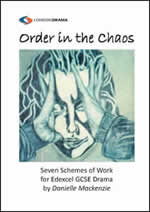London Drama News
Book London Drama's latest event, The Sister Dora Project at Sister Dora. London Drama's CPD event, Sister Dora, is inspired by Dorothy Heathcote’s work and includes a demonstration of teaching strategies, live 'role work' by student teachers, including Mantle of the Expert, teacher-in-role and designing & using teaching materials.
Don't miss this! Book at Sister Dora.
Help London Drama by shopping online!
As a charity London Drama has recently joined Give As You Live, a campaign to benefit charities by encouraging people to shop online.
Shop with your favourite stores and they'll donate to London Drama - all without charging you a penny more. From John Lewis to Expedia, you can compare thousands of products and brands that will all raise money for any UK cause and get the best deal online. Get started raising money for London Drama today. Find out more on the video below - select Full Screen icon to view properly.
Please sign up for London Drama's Give as you Live campaign at Give As You LIve. Many thanks!
Drama Support
Drama Job Vacancies
Current Drama jobs here.
To advertise your Drama job please contact
londondrama1@gmail.com
Borough Drama
Is your borough organised for Drama? Does it provide INSET or CPD courses? London Drama can support the development of initiatives and programmes for drama in boroughs. Please contact us if you would like more information.
Find out more
School Support
If your school would like to develop drama training please contact us. We will advise on or provide active resourcing.
Youth Theatres
Get Into Theatre helps you find out about career opportunities, work experience, training and much more.
Publications
Order in the Chaos
by Danielle Mackenzie
This new practical resource book by Danielle Mackenzie published by London Drama provides teachers with seven exciting units of work and materials designed for the GCSE Edexcel Drama Examintion, New Specification, helping to organise "Order" in all that potential "Chaos".
Published as a downloadable E-Book.
More info and download here
London Drama Members!
Get 5% discount on all London Drama books at LD Books. (Log in required.) Applies also to members of National Drama and English Speaking Board. Find out more
Student Reflections
On these pages you can read in their own words what motivated PGCE Drama Students to become Drama Teachers and what they make of the world of Drama so far.
Harnessing Students’ Cultural Capital in Lesson Design
It is no secret that KS4 and KS5 entries for Drama have been falling steadily over the past decade and continue to decline. This decline can be attributed to many factors, including the introduction of the EBacc and changes in funding. However, as part of the fight to boost KS4 and KS5 enrollment numbers, I would also like drama teachers to consider how careful design of the KS3 curricula can help increase students’ intrinsic interest in drama. After all, it is not enough for us teachers to know the value that drama skills can bring to all aspects of our lives; we must actively make the case to students that drama continues to be relevant in the 21st century.
And for many students, it can be difficult to see how drama could be relevant in their lives. Drama institutions with high cultural capital are traditionally (and some continue to be) exclusionary to students from disadvantaged or minority backgrounds. And in a society where people are increasingly communicating and consuming entertainment through screens, the study of an in-person performing art form might be quite removed from students’ daily lives. If KS3 curricula are not designed with students’ cultural capital in mind, and are taught with approaches or texts that do not harness students’ lived experiences, then drama teachers might have an even more difficult time making the case that drama is relevant in our students’ lives.
Over the course of my two PGCE placements, I was able to observe just how big of an impact cultural capital—when harnessed well—can have on interest and learning outcomes in the classroom. At both schools, one of the KS3 schemes-of-work being taught was the work of Bertolt Brecht. The first school’s scheme-of-work was designed without actively incorporating students’ cultural capital and lived experiences into the curriculum. Brecht’s overarching ideas were introduced in their original cultural context (Weimar Germany), while Brechtian techniques were explored without any sort of context at all, using only drama games.
In the second school, however, it was clear that the scheme-of-work had been explicitly designed with the students’ lived experiences and cultural capital in mind: students were introduced to and experimented with Brechtian techniques using Abi Morgan’s Fugee as a stimulus. This contemporary text, which centers on a young refugee arriving in England from Sierra Leone, actively incorporates Brechtian techniques and allowed the students to see clearly how one man’s ideas from 1930s Berlin might be relevant to their own lives in 2020s Southeast London. Harnessing the students’ cultural capital not only made it easier for the students to understand the effects that Brechtian techniques could create; the students were also more intrinsically motivated to experiment with the techniques, and use the text as a stimulus from which they could craft a message they saw as important and relevant.
I am not saying that the KS3 drama curriculum should consist only of texts, stimuli and characters that are familiar to students—students should have the opportunity to exercise their imagination and learn about situations and people they might not encounter in their daily lives. But, as teachers of one of the few school subjects without a National Curriculum, we drama teachers have the unique added responsibility, power and freedom of deciding what curriculum our KS3 students experience, and how they experience it. Harnessing our students’ cultural capital when making these decisions can only help in the mission to present drama as relevant and necessary amidst this enrollment decline.
Kendra Cui (July 2024)
Coming up
Our free CPD events are being organised in partnership with National Drama via Ticket Tailor - access them here.
In addition, we have some resources to support you via our e-news at Resources and our home page centre panel features our latest free online event
Surveys
Drama Networks Survey
Are you in an active local network for drama teachers? Would you like to be? Take the LD Drama Network Survey here
GCSE Drama Take Up Survey
Has EBacc undermined GCSE Drama take up? Take the survey here.
Courses Survey
We are always keen to hear what courses we can run for you. Please take our Courses survey here.
Mapping Drama Practice
Take the Survey of Drama Practice: it will only take a minute
Organisations

STEP is a borough-wide partnership linking the theatre community and education and youth sector in the London Borough of Southwark. STEP aims to equalise, extend and deepen the theatre and drama experience of all young people living in Southwark through the development of strategic partnerships between schools, youth and community groups and theatres and performing arts organisations. STEP's objective is to work closely with Southwark schools, youth and community groups and theatres and performing arts organisations to develop creative approaches to learning and provide innovative projects which stimulate children and young people's personal development and contribute to their educational attainment.
Find out more here.


